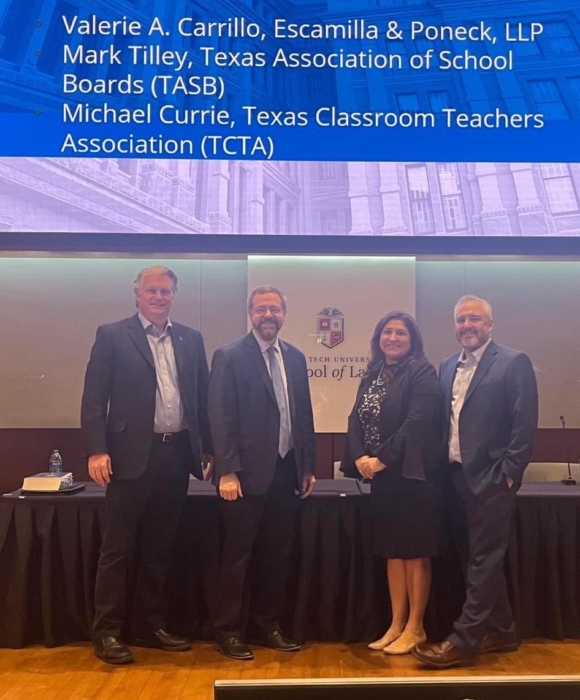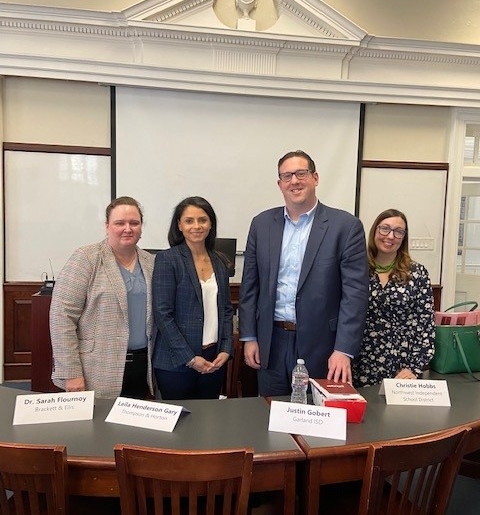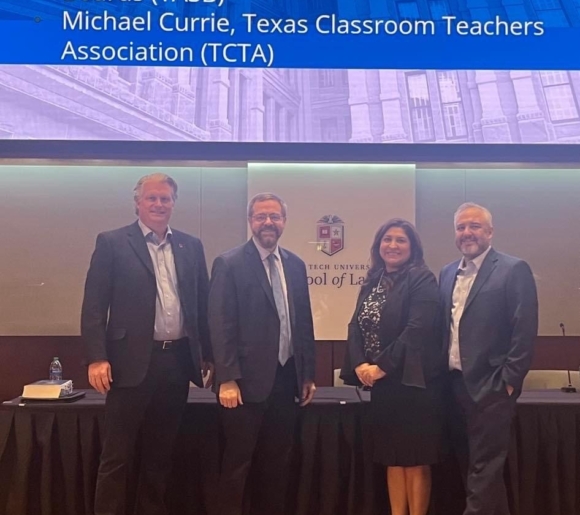Procurement & Contracts
Texas school districts spend billions of dollars each year purchasing the goods and services needed to educate children. School lawyers help districts spend these funds wisely and in compliance with state and federal laws and regulations. They negotiate contract terms to mitigate legal risks, ensuring that school funds are dedicated to the classroom rather than the court room.
Constitutional Law
“It can hardly be argued that either students or teachers shed their constitutional rights to freedom of speech or expression at the schoolhouse gate.”
Tinker v. Des Moines Indep. Comm. Sch. Dist., 393 U.S. 503 (1969).
The United States Constitution guarantees certain rights to its citizens. Students, staff, and the larger school community maintain those rights in their interactions with the district, whether inside the classroom, in the employment relationship, or at a school board meeting. For example, constitutional law prohibits a district from making discriminatory employment decisions based on an employee’s religion. For students, their constitutional rights might be reflected in issues such as student searches, dress codes, speeches, off-campus speech, and even cheerleader banners. School law attorneys help balance the rights of the individual with the school’s need to run safely, efficiently, and free from substantial disruptions to learning.
Title IX
Title IX is a federal civil rights law passed as part of the Educational Amendments in 1972. This groundbreaking legislation prohibits discrimination on the basis of sex in education programs and activities that receive federal funds. School law attorneys assist districts with understanding how this law applies to public schools and their athletic activities, extracurricular programs, CTE programs, and in instruction and district operations. School law attorneys also help districts understand how to respond to student or staff sexual harassment allegations under Title IX.
Special Education
School districts serve students with a variety of educational needs. Some students with disabilities are entitled to protections and services under the Individuals with Disabilities Education Act (“IDEA”). These students have a group of educators, parents and other service providers (in Texas, they are called an “ARD Committee”) who develop an individualized education program, tailored to meet the student’s specific needs. ARD Committees meet at least annually, and work collaboratively to ensure the student receives a free appropriate public education. In the event school districts and parents are unable to resolve disagreements informally, the IDEA and state law have various dispute resolution options available, including complaints (filed with the Texas Education Agency) or due process hearings.
Labor & Employment
School attorneys provide advice and counsel to schools on handling both day-to-day and sensitive workplace issues and represent clients in employment-related disputes in litigation and administrative proceedings. Attorneys provide advice on many employment-related matters, such as preparation of employee contracts, the hiring and background check process, accommodation of disabilities, and handling employee grievances and discipline. Schools also often invite attorneys to train administrators and staff on human resources-adjacent laws and regulations. Attorneys help represent school districts in contract employee non-renewal and termination administrative hearings, governed by the Texas Education Code, and appeals of employee grievance and employee discharge decisions to the Texas Commissioner of Education. Attorneys also represent schools against discrimination and retaliation claims filed with the EEOC and when such claims reach the court system. Other employment-related issues may also arise in litigation, including free speech, religion, due process, and whistleblower claims.
Board Governance
Local K-12 school districts in the State of Texas are governed by a board of trustees who, as a body corporate, have the exclusive power to govern and oversee the management of the district. The board is responsible for ensuring the that the superintendent (a.k.a. the chief executive officer) implements and monitors plans, procedures, programs, and systems to achieve appropriate, clearly defined, and desired results in the major areas of district operations. The board is responsible for adopting rules and bylaws necessary to carry out its powers and duties. The board may act only by majority vote of the members present at a meeting held in compliance with state open meetings laws. School lawyers routinely provide counsel to school boards in various areas of governance including the development of local policy, implementation of its statutory duties, and oversight of the superintendent.
Students
In any given school—public, private, K-12 or higher education—student issues present a wide array of legal challenges for an institution. Admissions, student expression under the First Amendment, bullying and harassment, athletic eligibility, student, discipline, gender identity, and health and child welfare and custody issues present dynamic challenges for schools—sometimes giving rise to issues of first impression and landmark jurisprudence and often overlapping with other areas of state and federal law.
Student discipline matters make up a large part of school law cases. Chapter 37 of the Texas Education Code encompasses state laws regarding student discipline in public school districts. Public and private schools govern student conduct through a body of rules pertaining to student behaviors and consequences for prohibited conduct violations and related due process or appeal procedures.
School Finance
Educational institutions benefit from tax-exempt bonds. Public finance, or bond attorneys handling finance transactions for public colleges and universities, private colleges and universities, public charter schools, public school districts, and private schools. Financing often takes the form of direct issuance bonds by an educational entity or the use of state or local issuers of revenue bonds on behalf of the educational entity. Bond lawyers working in this specialty area serve as bond counsel, underwriter’s counsel, and issuer’s counsel with the financing of major capital improvements such as the building of new school buildings or athletic facilities.
Public School Elections
Public school districts and community college districts hold elections to fill seats on their governing boards. School attorneys provide advice to districts regarding laws and regulations governing candidate eligibility and qualifications, election procedures, redistricting issues, political campaigns, finance, taxation, and revenue.
Open Government
Open government laws help make the work of government transparent to the public. The primary open government laws applicable to school districts in Texas include the Public Information Act and the Open Meetings Act. The Public Information Act is a series of laws related to the public availability of records maintained by a governmental entity. The PIA establishes a process that allows for the public to request information be made available and the process the government must follow to respond to such requests. The Open Meetings Act is a series of laws that regulate how meetings of a school district’s governing board must operate in order to allow the public access to the district’s business and decision-making processes. The OMA requires the public be given notice of the time, place, and subject matter of the meeting, and that the meetings be open to the public, except for expressly authorized closed session discussions. School lawyers routinely counsel both administration and school boards regarding compliance with the PIA and OMA.





